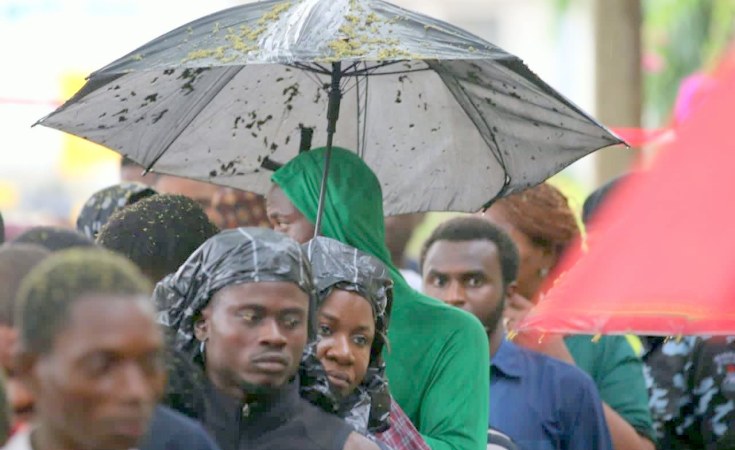The Commonwealth observers said institutional and legal reform is necessary if Nigeria is to make lasting progress on issues such as campaign finance, electoral offences and inclusion.
The Commonwealth Observer Group (COG) has released a final report on Nigeria's 2023 elections, identifying significant problems that undermined the credibility of the electoral process.
The report, published Monday, said the failure of the Bimodal Voter Accreditation System (BVAS) devices and the INEC Results Viewing (IReV) portal on, and after, election day are major factors that undermined the overall credibility, transparency and inclusivity of the elections.
The introduction of additional technologies in this election raised voters' hopes regarding the credibility and transparency of the counting and results processes, the group said, "Yet, the failures of BVAS devices and the IReV portal on and after election day highlighted the need for greater testing, training and transparency in the adoption of these technologies."
PREMIUM TIMES reported how various challenges experienced on election day, including delays in the provision of materials and late starting times, likely resulted in significant numbers of voters being unable or unwilling to cast their vote. Similarly, the malfunctioning of the BVAS led to the disenfranchisement of thousands of voters.
Headed by former President of South Africa, Thabo Mbeki, and supported throughout its mission by a team from the Commonwealth Secretariat, the COG observed the Nigerian presidential and national assembly elections which took place on 25 February 2023.
The Commonwealth observers said while Nigeria's 2022 Electoral Act represented a significant step forward, further institutional and legal reform is necessary if Nigeria is to make lasting progress on issues such as campaign finance, electoral offences and inclusion.
"The electoral reforms did little to address long-standing concerns regarding the regulation of political parties, particularly in terms of campaign finance, electoral offences and candidate nomination disputes," the group said.
The report noted that numerous security challenges facing the country and economic hardship also affected the electoral processes.
While INEC was not without fault, particularly regarding campaign finance, the report stated that a combination of resource constraints and insufficient legal powers means that its ability to enforce the law in these areas is inhibited.
In the months prior to the election, INEC Chairperson Mahmoud Yakubu stated on multiple occasions his belief that the institution was overburdened by the breadth of its responsibilities. Such a view was also expressed in the 2008 Uwais Report and the 2017 Nnamani Report on electoral reform.
Notwithstanding, the Commonwealth observers said INEC failed to adequately enforce the law on donations and party and candidates' expenditures. They also said political parties were not compelled to submit campaign expenditure reports.
"INEC did not make any reports available for public scrutiny," the group said, adding, "This has contributed to the continued impact of 'godfatherism' in Nigerian politics, including in party primary processes. Access to financial resources continues to be a more significant determinant of an aspirant's success than his or her capabilities, policies and party manifesto."
The report also lamented the harassment of journalists and the threat to media freedom during the election.
PREMIUM TIMES reported that violence against journalists and media workers increased to an unprecedented level during tbe elections. Between January and August 2023, 74 press attacks were recorded, according to data from Press Tracker - a record high that overtakes the 2019 record of 72.
"Nigeria has one of the most vibrant and fast-developing media industries in Africa, with a plethora of private print, broadcast and online outlets. Unfortunately, despite constitutional freedoms, journalists in Nigeria are inhibited by intimidation, arrests, violence and the use of defamation laws to stifle freedom of expression," the Commonwealth observers said.
In 2022, the country was ranked 129/180 by Reporters Without Borders.
The report also passed a verdict on the coverage of the election by Nigerian media organisations, saying some media houses demonstrated bias in their coverage of the election.
"The group was concerned that the state broadcaster demonstrated a bias towards the incumbent party in its election coverage. In print media, there was a blurring of the line between editorial content and political advertising. Many newspapers published political adverts on front pages that were neither as paid adverts nor as an editorial position," the report said.
However, some observers and civic groups were of the view that the bias of media houses, both public and private, was somewhat offset by the wide variety of news sources.
The Commonwealth group also said it was concerned by the lack of action taken by media regulators. It was also concerned that smaller parties and women and PWD candidates received proportionately less coverage than their counterparts.
"Nevertheless, the vibrancy of Nigeria's political landscape and the quality of its civil society remain the country's biggest strengths. So long as Nigeria can continue to tap into these most cherished and valuable resources, its ongoing journey of democratic consolidation and electoral reform will bring significant benefits for its people in years to come," the report stated.
Recommendations
The group recommended that state-owned and private media houses should be held to the standards contained in the Professional Code of Ethics, the Nigerian Media Code of Election Coverage and the Independent National Electoral Commission's Media Guidelines. This would improve impartiality and equitable coverage for all political parties and candidates during future campaigns.
The report noted that it is crucial that media-related violations are penalised expeditiously and impartially.
The report reiterated recommendations, which were also made in 2019, to address the concerning lack of women's political representation. Among the suggestions was that the National Assembly should revisit the previously tabled bills on seat quotas.
It also recommended other temporary special measures, as referenced in the National Gender Policy, with a view to passing such legislation in the parliament.


